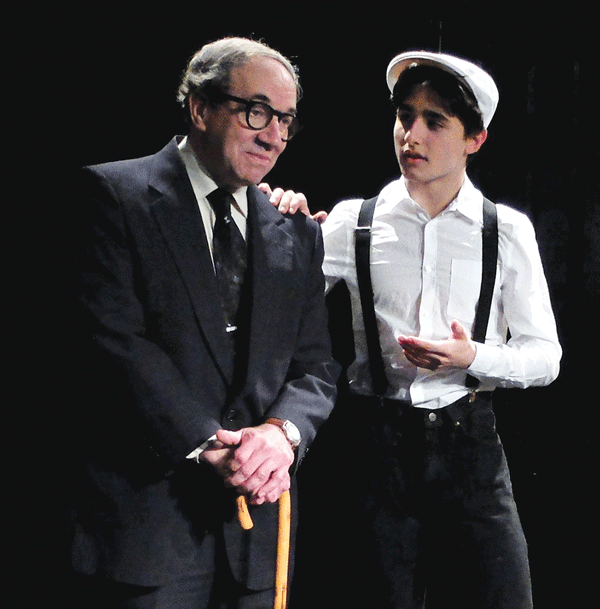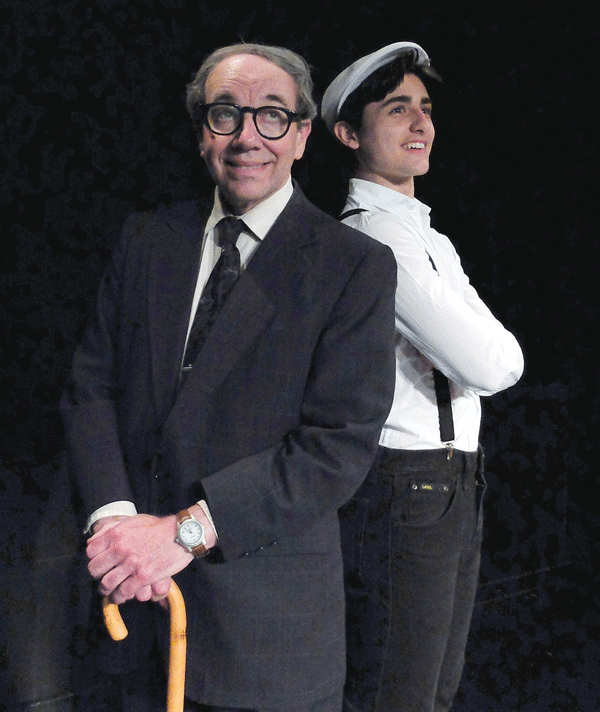BY MICHAEL LYDON (michaellydon.com) | My ambition is to reach the heart of the average American, not the highbrow nor the lowbrow but that vast intermediate crew which is the real soul of the country. My public is the real people.
—Irving Berlin
Through the 20th century’s first decades, George Gershwin, Jerome Kern, and Irving Berlin were three scrappy Tin Pan Alley competitors, each battling to catch the American public’s ear. All succeeded with masterful, still beloved songs, but Gershwin and Kern never doubted who was the winner and all-time champion. Said Gershwin, “I frankly believe that Irving Berlin is the greatest songwriter who ever lived.” Jerome Kern put it this way: “Irving Berlin has no place in American music. He is American music.”

From 1911’s foot-stomping “Alexander’s Ragtime Band” to the contrapuntal duet, “You’re Just in Love” in the 1950s musical, “Call Me Madam,” Irving Berlin was a one-man jukebox, pumping out hit after hit in Broadway shows and Hollywood movies.
New play brings Irving Berlin to life with empathy and economical skill
They were songs that America danced to (“Cheek to Cheek”), complained to (“Oh! How I Hate to Get Up in the Morning”), laughed to (“Anything You Can Do I Can Do Better”), cried to (“When I Lost You”), sighed to (“Always”), cheered to (“God Bless America”), and celebrated to (“White Christmas” and “Easter Parade”) — all sung by a pantheon of pop singers including Al Jolson, Ethel Waters, Fred Astaire, Ethel Merman, Frank Sinatra, Judy Garland, Bing Crosby, Nat “King” Cole, Billie Holiday, Doris Day, and Barbra Streisand — and by every cabaret vocalist from Maine to California who hopes for a full tip jar at the end of the night.
THEATER | IRVING BERLIN’S AMERICA
Written & directed by Chip Deffaa
Assistant Director, Peter Charney
Music Direction: Richard Danley
Choreography: Tyler DuBoys & Scott Thompson
Produced by Chip Deffaa & Sandra Nordgren
Sundays: June 22, 29 & July 6
Monday: June 30
Thursdays: June 19, 26 & July 10
All performances at 8 p.m.
At The 13th Street Repertory Theater
50 W. 13th St. (btw. Fifth & Sixth Aves.)
For tickets ($18), 13thstreetrep.org or 212-675-6677
Original cast recording available at cdbaby.com/cd/chipdeffaa4
Visit chipdeffaa.com for more info
Berlin’s success tells a story as American as his music. Born in Belarus in 1888 as Israel Beilin, son of cantor Moses Beilin, he fled, aged five, with his family after Russian soldiers burned their village to the ground. With only the clothes on their backs, they emigrated to America — and when their ship docked in New York harbor, Israel’s mother Lena kissed the ground. “This is America,” she said, hugging each of her eight children, “your new country.”

The Beilins found a windowless cold-water basement on the Lower East Side’s Cherry Street, but Moses couldn’t find work as a cantor and, after teaching Hebrew to support his family, died when Irving was thirteen. Nothing daunted, Izzy left school and sang popular ballads for pennies in Bowery saloons, sometimes making up off-color lyrics. Plugging songs at Tony Pastor’s restaurant on 14th Street near Union Square marked a big step up, but his meteoric rise began when his first hit, “Alexander’s Ragtime Band,” sparked a national dance craze (and the careers of Vernon and Irene Castle).
“Berlin’s life makes a fascinating tale. But oddly, he was fanatical about his privacy, blocking all attempts to dramatize his life,” says Chip Deffaa, a former New York Post cabaret and theater reporter who fell in love with old-time showbiz when growing up in suburban New Jersey.
As a playwright, Deffaa has made a specialty of portraying showbiz legends. He’s written six shows about George M. Cohan, including “George M. Cohan Tonight!” — originally produced by the Irish Repertory Theater and by now in theaters from London to Seoul. His “Johnny Mercer Jamboree” premiered at Rochester’s Downstairs Cabaret Theatre. “One Night with Fanny Brice,” (one of three shows he wrote about her) was an Off-Broadway hit, and has had numerous regional productions. “The Seven Little Foys” recently premiered at the Seven Angels Theatre in Waterbury, Connecticut (it’s among the three shows he’s written about Vaudevillian Eddie Foy and his troupe of seven children). Now, Deffaa has put Berlin’s life on stage. “Irving Berlin’s America” is a two-man show starring stage/screen veteran Michael Townsend Wright and Giuseppe Bausilio (who currently appears on Broadway, in “Newsies”).
“The play’s plot is simple,” says Deffaa. “In his old age, Berlin meets a young man who asks him about his life and music. Berlin answers with intimate memories, and the two sing a couple dozen or more of his fifteen hundred songs. By the end Berlin sees that, all in all, he lived a good life. Then the two go out for coffee. But I put mystery around the edges of the plot: who is this young man, and why do the two meet on September 22, 1989, the night that Berlin died at 101?”
Wright plays Berlin with a warm understatement, and Bausilio is youth incarnate, eager and curious. “I wrote the play with Wright in mind for Berlin,” says Deffaa. “We’ve known each other since he was a regular on television’s ‘Uncle Floyd Show.’ And Giuseppe is a true triple-threat, a singer, dancer, actor. We’re working around his availability from ‘Newsies,’ for this tryout run.”
Deffaa’s play brings Berlin to life with empathy and economical skill, but the playwright is the first to admit that it’s Berlin’s music that makes “Irving Berlin’s America” soar: “ His songs are irresistible!” In the Great American Songbook, Berlin songs stand out for a plainspoken simplicity surprisingly dotted with striking images:
How many times a day do I think of you?
How many roses are sprinkled with dew?
A true pro, Berlin wrote many show songs after productions had started. “I did most of my work under pressure,” he told one interviewer. “I’d attend rehearsals daytimes, then after dinner write a new song until dawn and bring it in the next day.” He could only play the piano in one key, but when he asked composer Victor Herbert whether he should study composition, Herbert advised against it: “You have a natural gift for words and music. Learning theory might cramp your style.”
Nor did Berlin ever lay down any rules for writing lyrics: “If I don’t have rules, I can do as I like.” Asked the age-old question, which comes first, the music or the lyrics, Berlin answered, “Usually I compose my tunes and then fit words to them, but sometimes it’s the other way. The lyric makes a song a hit, but the tune makes a song last.”
Berlin wrote songs on many subjects, but his best songs are deeply personal, poignant ballads like “Always,” written for his first wife who died young, or “How Deep is the Ocean,” written for Ellin Mackay, the society woman who became the love of his life. Berlin wrote the joyful “Blue Skies” in 1926 after his first daughter’s birth. It became an evergreen, recorded by dozens of singers (in 1978, Willie Nelson made the song a #1 country hit, 52 years after Berlin first banged it out).
“One secret of Berlin’s success,” says Deffaa, “is that throughout his life he had a habit of returning to his old haunts in Union Square, Chinatown, and the Bowery — spots not so far from the theater where we’re trying out this show! One thing about New York: no matter how far up or down you go on the ladder of success, you can reach the opposite by walking a few blocks. Berlin always remembered his childhood sleeping under tenement steps, eating scraps, and wearing secondhand clothes, as hard but good. ‘Every man,’ he’d say, should have a Lower East Side in his life.’ ”

















